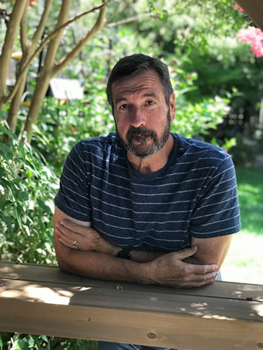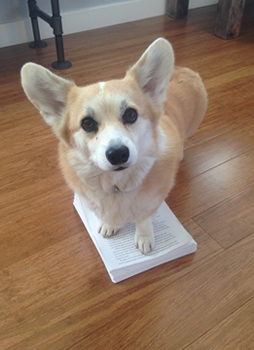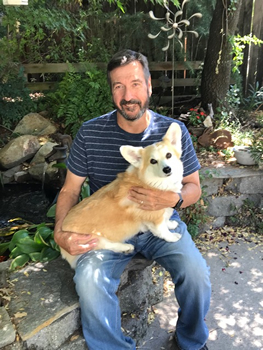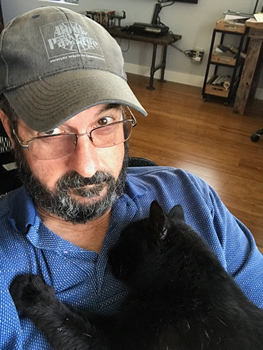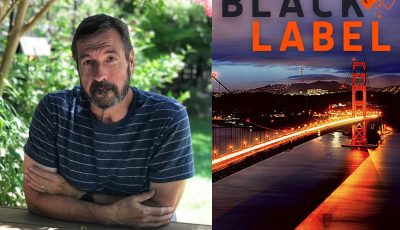

On the Cover: James L’Etoile
Taking a Genre Departure
 By Dawn Ius
By Dawn Ius
James L’Etoile didn’t set out to be an author—in fact, writing wasn’t even on his radar for most of his 29 years behind bars.
As a prison employee, just to be clear.
L’Etoile spent almost three decades as a warden, hostage negotiator, and prison administrator before realizing he needed a break from the dark side of human nature—and that the act of writing could provide him the perfect escape from the violence and gang violence he witnessed daily in his career.
Perhaps predictably, his previous novels, which include the highly acclaimed thriller At What Cost and the award-nominated follow-up, Bury the Past, fall more under the police procedural realm. But with his latest release, BLACK LABEL, L’Etoile takes a genre detour, introducing us to a fierce new protagonist in pharmaceutical executive Jillian Cooper.
L’Etoile shows us early on that Jillian is no one to be trifled with, but when she wakes up in a strange apartment one morning, a suspect in the murder of her company’s CEO, her strength is tested yet again—she’s on the run not only from the police, but also gang enforcers, all of whom think she’s guilty.
Ultimately, Jillian must unravel the company’s secrets and prove her innocence if she doesn’t want to become the next victim.
BLACK LABEL is a twisty, complex, and terrifying thriller that will have you turning pages well into the night. L’Etoile talks more about it in this interview with The Big Thrill.
Congrats on your fourth traditionally published novel. I’d love to hear a bit about your path to publication.
One of my first assignments was as a probation officer writing felony pre-sentence reports for the court. I’d go to the jail and talk to the defendant and get their version of the crime they’d been convicted of, gather all the investigative reports from the detectives, take statements from the victims, and compile a narrative summary of the crime and make a recommendation to the judge on how much prison time the defendant should receive. I didn’t know it at the time, but I was writing crime stories back then, and I think it helped prepare me to create the fictional stories I write today.
If I had to narrow it down to the one thing that helped me on the path to becoming published, I’d have to say it was the Book Passage Mystery Writers Conference. Book Passage is a wonderful independent bookstore in Northern California, and they hold an annual conference devoted to all aspects of writing mysteries and thrillers. The conference gave me the confidence to write the stories I wanted to tell, providing a solid foundation of the craft and the business of writing—something very different than the world I experienced in prison. I’ve returned to the conference as faculty in recent years, and I’m always learning something to make me a better writer.
You’ve had such a fascinating career. How has your experience as a warden, hostage negotiator, and parole director influenced your writing?
My experience working around convicts with nothing to lose gave me a unique perspective as a thriller writer. When you’re creating a character, say, a serial killer or sociopathic prison gang hitman, or a cop, for that matter, it’s easy to come off with something full of stereotypes and a little thin.
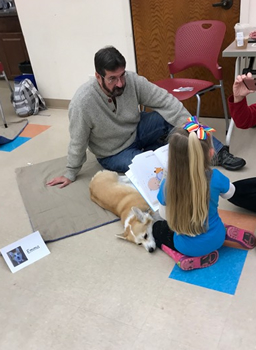
L’Etoile and his writing assistant Emma, who also do therapy dog work, help with a children’s reading program.
Unless you’ve lived it, it’s hard to describe, but I worked in a maximum security prison in a security housing unit, which is a prison within a prison. When a convict murders someone in the general population, they came to my unit. Two hundred men, all serving life, locked into a single concrete building—and you’re locked in there with them. It gives you a unique opportunity to get to know the likes of the Hillside Strangler, the Zebra Killers, the Onion Field Killers, the Tool Box Killers, and some of the Manson Clan.
Most writers, thankfully, haven’t had to get up close and personal with a murderer, or if they have, it’s been a shorter-term interview of a more journalistic nature. And that’s wonderful background, but serial killers and prison gang shot-callers are master manipulators, skilled at giving their audience the narrative they want to project. When you live with these guys as I did for months on end, those artificial fronts fall apart, and you’re left with the real nuts and bolts of that character—their motivations, their obsessions, and their fears. It’s given me a rich repository to create accurate, meaningful, and more fully developed characters.
BLACK LABEL is a bit of a departure from your earlier police procedurals—which seems like a good fit given your career. What inspired this story—and this genre shift?
It’s definitely a changeup. I wanted to write something different and part of that decision was driven by the social upheaval we’ve experienced in the last few years. I wanted to get a feel for where the police procedural subgenre would go with all this vibrant community push for reform and accountability. I don’t believe we’re going to see procedurals ignoring the social contract between cops and community in the future. I needed time to figure out where those stories would go, where I could take them, and I think we’re going to have richer storylines because of it.
BLACK LABEL has been a project I’ve had smoldering for about three years. The first idea for the story came after a session of the Book Passage Mystery Writers Conference where we had the attending writers explore character motivation. One of the universal factors was fear. Fear of the unknown, fear of losing everything that defined you, and the fear that comes with a loss of control over your life. In BLACK LABEL, Jillian’s fear includes the broken trust when you discover a new drug is killing people. Sounds like some of the narrative out there in social media, doesn’t it?
Your protagonist, Jillian, hits a little too close to home—I admit to being a bit of a workaholic myself. Aside from a good read, what message would you like readers to take away from this story?
I have to admit I share a little bit of Jillian’s tendency to throw herself into the job at the expense of other aspects of her life. Jillian is a cautionary tale of a smart, driven, powerful woman who devotes herself to the company. She’s sacrificed her personal life, and she’s made it to the corporate boardroom. But she’s paid a price for her hyper-focus on the job, and it might just cost her life. Jillian, I think, would advocate for all of us making more of an effort to find a work and life balance.
Jillian is a formidable character—strong, driven, authentic. What’s your secret for writing such great female characters?
Thanks for calling her formidable, because I think she’s always had the inner strength, but she needed to find it. Writing a female character is something I don’t take lightly. The last thing I wanted was to characterize Jillian as a weak damsel in distress who needs someone to come to her rescue. While she does get help in her search for the truth, she does it on her terms, and she’s in the driver’s seat.
I’ve been fortunate enough to surround myself with strong, smart women. There were women I worked for in prison who were without a doubt tougher than any convict on the yard. I have the same experience in the publishing world. My entire team consists of brilliant women: beta readers, agents, editors, and publishers—all women I trust to keep me on track when it comes to writing someone as complex as Jillian.
I know that you start with character when writing—often modeled after someone you know. What are some of the factors that go into creating a character that you know you’re going to have to live with for at least a year?
I borrow character traits, quirks, and personalities from people I’ve encountered over the years. I do begin with character first. I have to know who they are and be comfortable with them roaming around my thoughts for months. With Jillian, for example, I needed to know her intimately before I started writing her story. Her family history plays an important role in how she responds to the events unfolding around her. She has a fear of following her mother’s slow mental health decline, and her sister’s jealousy is a factor in Jillian’s isolation. For me, it’s more than motivation or character arc. It’s all those life factors we all deal with that define a character. The best way I’ve found to capture a character’s key elements is to write a few pages of background, including physical traits, work, school, family, fears, and anything that character might encounter in the story. What helped me prepare Jillian was to write a short story in first person of Jillian in the boardroom to get a sense of how she interacts with a male-dominated corporate board.
Given your past experience, we’d expect the law enforcement aspects of your books to feel authentic, but in BLACK LABEL, you tackle the pharmaceutical industry. What was the most interesting—or terrifying—thing you learned during your research?
There’s still a smidgen of law enforcement interaction in BLACK LABEL. But the focus is on Big Pharma. I don’t think it’s a spoiler since it’s in the back cover copy, but Jillian uncovers a counterfeit pharmaceutical operation. When I started digging in on the subject of counterfeit pharmaceuticals, I expected to find corroboration of the news reports of spikes in opioid overdose deaths. But what surprised me was that the market for fake drugs is a $200 billion a year industry, and it’s growing by 20 percent a year. Most of the diluted and counterfeit drugs are sold to the Third World to unsuspecting patients.
You probably get this question a lot, but I’m asking it anyway. What was the most terrifying or fascinating thing that happened to you as a warden or hostage negotiator? Were any scenes in your books inspired by real-life events?
It’s hard to narrow down the most interesting moment. The first prison riot is always an eye-opener. First murder committed in front of you leaves a lasting impression. It comes down to witnessing the worst society has to offer, balanced with men and women who actually want to make a change and make a positive impact on others.
Almost every short story and novel has a scene drawn from my past. In the case of At What Cost, the premise of the book came from an incident while I worked in the security housing unit. An Aryan Brotherhood gang member was shot and killed to stop his stabbing assault on another inmate. We found out that the hospital wanted to donate his organs. Those of us who worked with this nasty, filthy, racist thug, couldn’t imagine who’d want those organs. Soon after, an officer’s child needed a bone marrow transplant, and we all got on the registry. But something about the two stuck with me, and in At What Cost, my protagonist is a detective on the hunt for a serial killer who’s harvesting his victims’ organs. The detective’s son needs a kidney transplant to survive. Does the detective hunt down the killer, or make a deal with him to get the organ his son needs to live?
What can you share about what you’re working on next? Any chance BLACK LABEL is Book 1 in a series?
There might be a return to Jillian if she’ll forgive me for dragging her through the wringer this time. I’m returning to a procedural next with the release of Dead Drop in July 2022. The story takes place in the desert Southwest and dives into the complex immigration issues in the region. Detective Nathan Parker finds a series of migrants dead on the trail near the border. He soon finds his life depends on the same people he pursued for illegal immigration.
- The Ballad of the Great Value Boys by Ken Harris - February 15, 2025
- Don’t Look Down by Matthew Becker - February 15, 2025
- The Wolf Tree by Laura McCluskey - February 14, 2025

